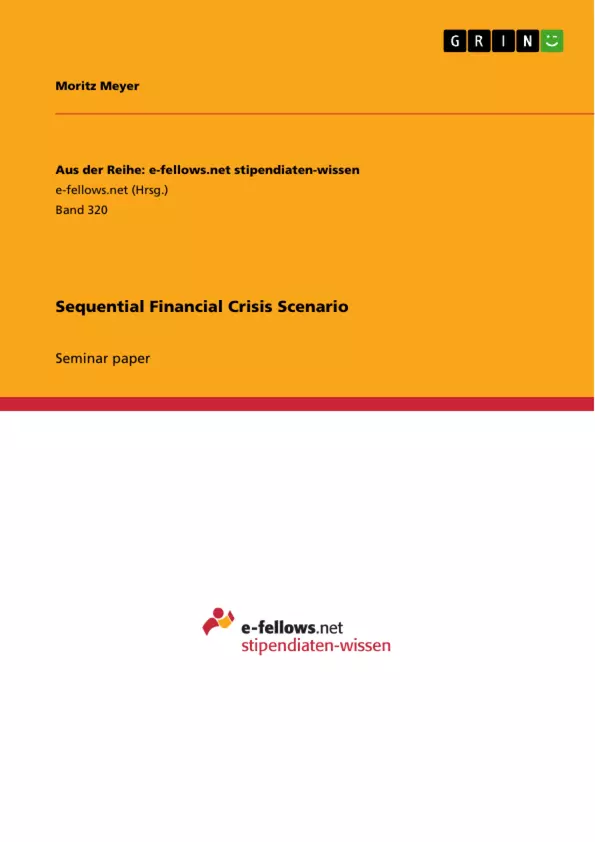Global imbalances in financial markets, especially the current account deficit in the US and the high foreign reserves in Asian countries, are considered to have influenced the housing bubble in the USA and other Western countries. This research proposal establishes a link between the twin crises in Asia starting in 1997 and the current need of central banks in this region to accumulate so called „hard currencies“ like the US Dollar and the Euro. In the following we focus on the theory of sudden stops and introduce a second
element that describes a run on the foreign reserves of the central bank. Firstly, agents in the economy run on domestic banks and change bank deposits into domestic currency. Secondly, they escape into hard currencies because they fear that exchange rate movements lower the real value of the domestic currency. This challenges foreign reserves of central banks, such that the central bank finally cannot provide any additional foreign reserves to the domestic banking system. To guarantee that foreign reserves are sufficient for all agents in the country central banks started building up large foreign reserves to self-insure against financial fragilities.
Inhaltsverzeichnis (Table of Contents)
- Global Imbalances in Financial Markets
- Increased Risk Sharing in Emerging Economies
- Theoretical Approach and Model
- Simple Model
- Conclusion and Policy Implications
Zielsetzung und Themenschwerpunkte (Objectives and Key Themes)
This research proposal aims to explain the accumulation of foreign reserves by central banks in emerging economies in response to financial crises. It focuses on the concept of sudden stops, where foreign investors abruptly withdraw capital from a country, triggering a run on domestic banks and a subsequent demand for hard currencies. The paper aims to provide a theoretical model to analyze this phenomenon and its impact on exchange rates and central bank liquidity.- Global imbalances and the flow of capital to Western financial markets
- Sudden stops in capital flows and their impact on emerging economies
- The role of central banks in mitigating financial crises
- The relationship between exchange rate fluctuations and firm insolvency
- The accumulation of foreign reserves as a self-insurance mechanism
Zusammenfassung der Kapitel (Chapter Summaries)
- Global Imbalances in Financial Markets: This chapter discusses the growing global imbalances in international financial markets, particularly the current account deficit in the United States and the accumulation of foreign reserves by emerging economies. It explores various explanations for this phenomenon, including managed exchange rate regimes, sovereign wealth funds, and the need for self-insurance against financial crises.
- Increased Risk Sharing in Emerging Economies: This chapter examines the concept of increasing risk sharing in emerging economies as a response to global risk aversion, including sudden stops. It links the accumulation of foreign reserves to the lessons learned from the Asian financial crisis of 1997, when investors withdrew capital from emerging markets, leading to currency devaluation, bank runs, and a shortage of foreign exchange liquidity.
- Theoretical Approach and Model: This chapter introduces a theoretical model to analyze the impact of sudden stops on emerging economies. It focuses on the behavior of firms, particularly their decision to continue production or close down in response to changes in investor expectations and exchange rates. The chapter outlines the two-step process: a sudden stop in foreign investment triggers a run on domestic banks, followed by a run on central bank foreign reserves.
- Simple Model: This chapter develops a simple model of a firm's decision to continue production or default, based on expectations about future exchange rate developments. The model incorporates the cost of capital and the probability distribution of different states of the world. It demonstrates how a high probability of currency devaluation can lead firms to default, further increasing the risk for foreign investors and fueling further currency depreciation.
Schlüsselwörter (Keywords)
The research paper explores the dynamics of financial crises in emerging economies, focusing on the role of sudden stops, bank runs, foreign reserves, and exchange rate fluctuations. It examines the behavior of firms in response to these events and the challenges they pose to central banks in their role as lenders of last resort. Key terms include sudden stop, bank run, foreign reserves, exchange rate depreciation, lender of last resort, and global imbalances.Frequently Asked Questions
What are global imbalances in financial markets?
Global imbalances refer to the current account deficit in the US and the high foreign reserves in Asian and other emerging economies, which have influenced housing bubbles in Western countries.
What is the "sudden stop" theory?
Sudden stops occur when foreign investors abruptly withdraw capital from a country, often triggering a run on domestic banks and a demand for hard currencies.
Why do central banks in emerging economies accumulate foreign reserves?
Central banks accumulate large foreign reserves as a self-insurance mechanism against financial fragilities, exchange rate fluctuations, and potential bank runs.
How does currency devaluation affect firms according to the model?
A high probability of currency devaluation can lead firms to default, which increases risk for foreign investors and can fuel further currency depreciation.
What role did the 1997 Asian financial crisis play in this research?
The 1997 crisis serves as a historical link to explain why central banks today feel the need to accumulate "hard currencies" like the US Dollar and Euro to prevent similar collapses.
- Arbeit zitieren
- Moritz Meyer (Autor:in), 2009, Sequential Financial Crisis Scenario, München, GRIN Verlag, https://www.grin.com/document/182527



